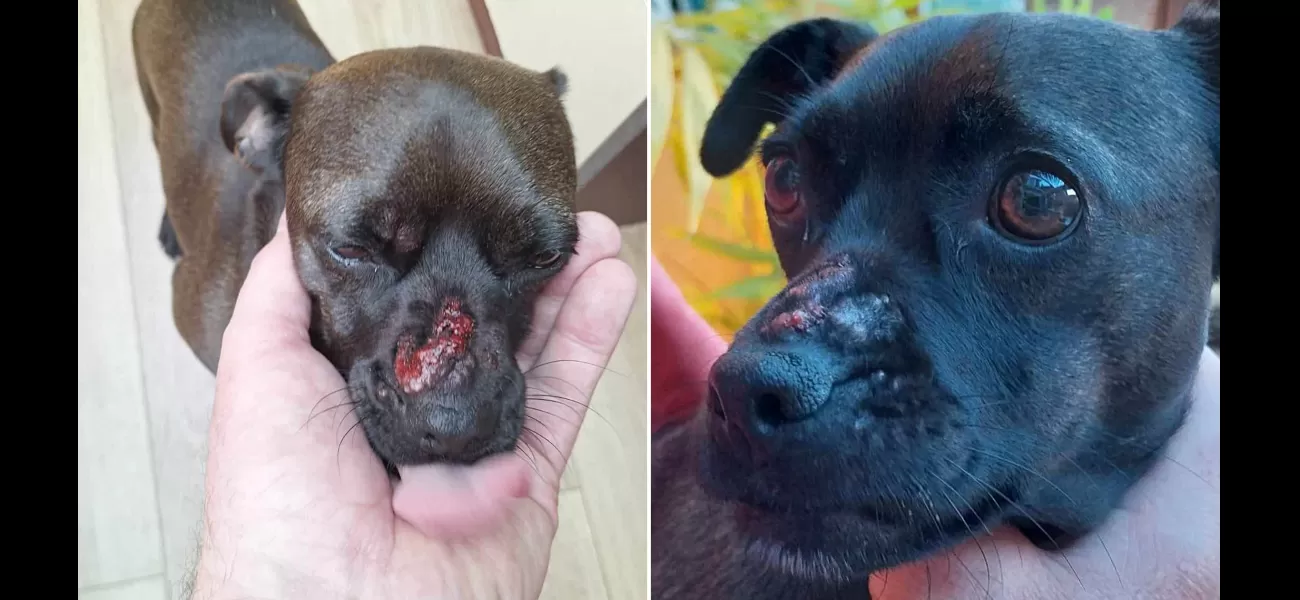A mixed breed dog in the UK develops painful blisters from contact with the country's most hazardous plant.
Sue Earley's pet Peanut was burned by the UK's most dangerous plant while on a walk.
May 10th 2024.

Sue Earley was out for a walk with her beloved pup Peanut in Fordingbridge, Hampshire, enjoying the beautiful surroundings when something truly unexpected happened. As they strolled along their usual route, Peanut suddenly started to show signs of discomfort. Sue couldn't quite figure out what was bothering her little companion until she noticed a lump forming on her nose. At first, she thought it might have been a bee or wasp sting, but as time passed, the lump turned into angry red blisters.
Sue remembered seeing giant hogweed plants along the path where they were walking and realized that Peanut must have brushed past one of them. These plants are known to carry a sap that can cause gruesome burns when exposed to sunlight. What's worse, the pain is often delayed, so victims may continue to burn without realizing the severity of their injury. Peanut's nose was proof of this as the blisters continued to get worse overnight.
The next day, Sue rushed Peanut to the emergency vet, where she was given a steroid injection and antibiotics. Thanks to Sue's quick thinking and action, Peanut is now on the road to recovery. Sue, however, wants to warn others about the dangers of giant hogweed. She explains that these plants can spread their sap with just a brief moment of contact and are often found in areas where people walk their dogs.
Sue urges people to be cautious, as giant hogweed can easily be mistaken for harmless plants like cow parsley. She also advises pet owners to regularly check their animals for any signs of exposure, as it may not always be easy to spot. As for Peanut, she is lucky to have been adopted by Sue from Hungary Hearts Dog Rescue and is now in good hands.
Sadly, Peanut is not the only victim of giant hogweed. This invasive plant, originally from the Caucasus region, was brought to Britain as an ornamental plant in the 1800s and has since spread uncontrollably. In 2015, it was even labeled as "the most dangerous plant in Britain" by Mike Duddy of the Mersey Basin Rivers Trust. Sue hopes that by sharing her story, she can prevent others from experiencing the pain and harm caused by this dreaded plant.
Sue remembered seeing giant hogweed plants along the path where they were walking and realized that Peanut must have brushed past one of them. These plants are known to carry a sap that can cause gruesome burns when exposed to sunlight. What's worse, the pain is often delayed, so victims may continue to burn without realizing the severity of their injury. Peanut's nose was proof of this as the blisters continued to get worse overnight.
The next day, Sue rushed Peanut to the emergency vet, where she was given a steroid injection and antibiotics. Thanks to Sue's quick thinking and action, Peanut is now on the road to recovery. Sue, however, wants to warn others about the dangers of giant hogweed. She explains that these plants can spread their sap with just a brief moment of contact and are often found in areas where people walk their dogs.
Sue urges people to be cautious, as giant hogweed can easily be mistaken for harmless plants like cow parsley. She also advises pet owners to regularly check their animals for any signs of exposure, as it may not always be easy to spot. As for Peanut, she is lucky to have been adopted by Sue from Hungary Hearts Dog Rescue and is now in good hands.
Sadly, Peanut is not the only victim of giant hogweed. This invasive plant, originally from the Caucasus region, was brought to Britain as an ornamental plant in the 1800s and has since spread uncontrollably. In 2015, it was even labeled as "the most dangerous plant in Britain" by Mike Duddy of the Mersey Basin Rivers Trust. Sue hopes that by sharing her story, she can prevent others from experiencing the pain and harm caused by this dreaded plant.
[This article has been trending online recently and has been generated with AI. Your feed is customized.]
[Generative AI is experimental.]
0
0
Submit Comment





